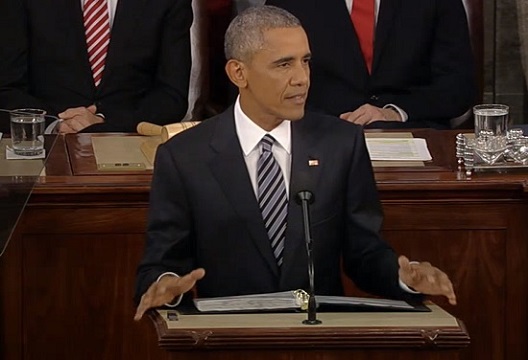 On December 6, 2015 President Barack Obama spoke to millions of Americans in a nationally televised address on the progress that has been made in the war against the Islamic State (ISIS or ISIL) in both Iraq and Syria. “[I]f Congress believes, as I do, that we are at war with ISIL, it should go ahead and vote to authorize the continued use of military force against these terrorists,” President Obama remarked. “For over a year, I have ordered our military to take thousands of airstrikes against ISIL targets. I think it’s time for Congress to vote to demonstrate that the American people are united, and committed, to this fight.”
On December 6, 2015 President Barack Obama spoke to millions of Americans in a nationally televised address on the progress that has been made in the war against the Islamic State (ISIS or ISIL) in both Iraq and Syria. “[I]f Congress believes, as I do, that we are at war with ISIL, it should go ahead and vote to authorize the continued use of military force against these terrorists,” President Obama remarked. “For over a year, I have ordered our military to take thousands of airstrikes against ISIL targets. I think it’s time for Congress to vote to demonstrate that the American people are united, and committed, to this fight.”
Nearly a year since President Obama first submitted his own draft AUMF to Capitol Hill, members of the congressional leadership are finally beginning discussions on what provisions should be incorporated into a war resolution — and whether that resolution can pass with sufficient bipartisan support to become law. Recognizing that Congress as an institution needs to put some skin into the game, Speaker Paul Ryan has tasked his chairmen to brainstorm whether a successful AUMF is realistic in Washington’s current political climate. Majority Leader Mitch McConnell, at first reluctant to even broach the subject in an election year, went a step further by fast-tracking a draft AUMF to the floor.
At its core, creating, debating, and passing a war resolution is a legal exercise. The US Constitution grants the legislative branch the sole authority to declare war or authorize the use of military force. The entire process of debating an AUMF, however, goes beyond legalese and the intricacies of statutory law. Indeed, the whole process, from writing the document to debating in full public view of the American people, can be just as important as the contents of the resolution itself. Slowly but surely, an increasing number of Republicans and Democrats are beginning to understand that while the administration has a reasonable legal argument in favor of using the 2001 AUMF, it is incumbent upon members of Congress to demonstrate to the people they represent that the legislature is a co-equal branch of government—even in a time of war.
The problem with war resolutions, of course, is that every Senator and Member of Congress has their own opinion about how extensive the president’s authority should be, how long the wartime authority should last under a prospective AUMF, what groups or entities should be deemed “associated forces” under the label of ISIS, and whether previous AUMF’s that may apply to the conflict against ISIS should be revoked or superseded.
A number of ISIS war resolutions have been proposed over the past year. The Senate Foreign Relations Committee passed a Democrat-written AUMF in December 2014 that required an extensive strategy from the administration and a report on progress every sixty days. A bipartisan AUMF from Senators Tim Kaine and Jeff Flake forbid “[t]he use of significant United States ground troops in combat.” Senator Lindsey Graham’s proposal, one that he urged President Obama to support, is the most open-ended legislation that Congress could possibly provide to the administration: no time limit, no geographical limit, and no constraint on the use of US ground forces. All of these draft resolutions are worthy of debate and consideration in a democratic society; in an ideal world, the Senate Foreign Relations Committee and House Foreign Affairs Committee would work through these resolutions in an attempt to reach some sort of consensus. Unfortunately, domestic politics often gets in the way: with the exception of some who are indeed consensus builders (Tim Kaine, Jeff Flake, Robert Menendez, Adam Schiff, and House Armed Services Chairman Mac Thornberry to name a few), both sides of the aisle are rarely willing to concede some of their demands on whether U.S. ground troops should be involved, how long the authorization should last, and how broad the term “associated forces” should apply. If political consensus were easy, passing an AUMF would have been done a long time ago.
Is President Obama granted the legal license to wage war on ISIS through the power provided to the executive branch under the 2001 AUMF? This is a question for constitutional scholars to consider. Yet this is not the only question the American people should be asking themselves, because the second question is as vital to US democracy as the first: has Congress afforded the people who have elected them with a national debate on a war that the United States has been leading over the past seventeen months?
President Obama does not think so, and neither do the American people, who are wondering just where their elected representatives stand on a war that is nearly a year-and-a-half old.
Daniel R. DePetris is a Middle East analyst at Wikistrat, Inc. and a contributor to The National Interest.
Image: Screenshot of President Barack Obama delivering his final State of the Union address. (White House)
